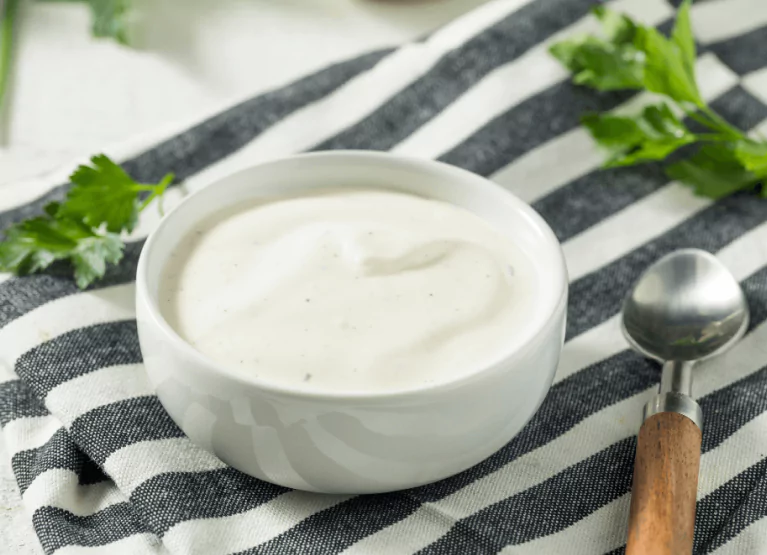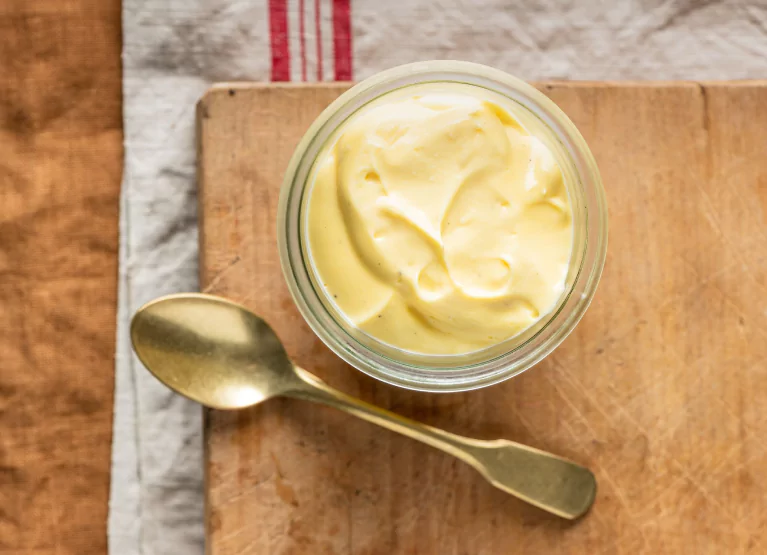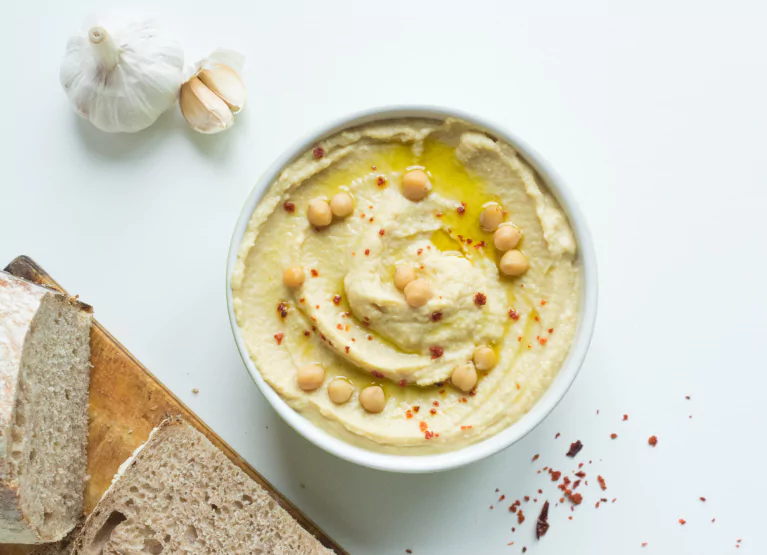The Healthiest Condiments to Add to Your Diet
.webp)
Key Takeaways
Everyone has a favorite condiment that they love to put on their hamburger, hotdog, or sandwich. Whether it’s ketchup, mustard, pesto, or mayo, you probably have one that’s come to mind.
Popular American condiments include everything from mayonnaise, mustard, and nut butters to tartar sauce, ranch or even hummus. These are just a few examples — there are hundreds of different types of condiments used all over the world.So, are condiments healthy? And which are the best options for your health? Read on to find out.
Condiments To Limit or Avoid
Condiments are made up of a wide range of sauces or spreads that you add to foods to enhance or complement their flavor. Unfortunately, however, some condiments have ingredients that may not be good for you. Here are some types of condiments you may want to avoid.
Condiments High In Added Sugars

Added sugar is sugar that has been added to a food or beverage after it has been produced or prepared. These types of sugars can increase your chance of both prediabetes and type 2 diabetes, as well as inflammation and obesity. Condiments that may be high in added sugar include:
- Ketchup
- Teriyaki sauce
- Sriracha
- Barbecue sauce
It’s important to consider that each brand may include different ingredients, and not all brands of these sauces will have added sugar. Always check ingredient labels at the store, or try making your favorite condiment at home where you can control the ingredients.
Condiments That Contain Artificial Sweeteners
Artificial sweeteners are chemicals that are added to food in place of sugar. Aspartame, sucralose, and xylitol are common artificial sweeteners.While there is much debate around the health effects of artificial sweeteners, some research shows that they may be linked to type 2 diabetes and obesity. This might be because they don’t activate our food reward pathways like natural sweeteners, making us consume more than we normally would.The research in this area is limited, and more studies are needed to determine how artificial sweeteners can affect long-term health. Still, you may want to look out for these ingredients on your food labels or consult a registered dietitian or nutritionist.
High-Sodium Condiments

High amounts of added salt are common in a number of popular condiments. A diet high in sodium may significantly increase your risk of conditions such as stroke and high blood pressure.The FDA recommends that you limit your sodium consumption to less than 2,300 milligrams per day, while other research suggests less than 5,000 milligrams per day. Condiments that may be high in sodium include:
- Ketchup
- Soy sauce
- Teriyaki sauce
- Cocktail sauce
- Ranch dressing
If possible, opt for low-sodium versions of these condiments.
Condiments That Contain High-Fructose Corn Syrup
High-fructose corn syrup is a sweetener that is derived from corn. These added sugars are associated with numerous health risks, including type 2 diabetes and insulin resistance, obesity.High fructose consumption may also lead to an increased risk of developing gout and kidney stones in men. Condiments that may contain High-fructose corn syrup include:
- Pancake syrup
- Jam or fruit preserves
- Ketchup
- Barbecue (BBQ sauce)
- Steak sauce
- Pickle relish
- Peanut butter
Again, remember that all brands of these sauces will have high-fructose corn syrup, so make sure to check their ingredient labels.
9 Healthy Condiments To Try
Some sauces and spreads may even have nutritional benefits, which is great news if you love adding condiments to your sandwich or burger. But, with so many condiments to choose from, you may be wondering which options are the best for your health.Here are nine of our favorite healthy condiments to try.
1) Mayonnaise

You may be surprised to see mayonnaise on this list. Mayonnaise is an emulsion usually made by combining oil, egg yolks, and vinegar or lemon juice.This spread doesn’t have a reputation as a healthy condiment, which is largely due to its high fat content. And while it’s true that one tablespoon of mayonnaise contains 10 grams of fat, 8.5 of those grams are polyunsaturated fat and monounsaturated fats.
These fats help maintain your cells and can reduce your bad cholesterol levels, lowering your risk of heart disease and stroke. Monounsaturated fats also contain vitamin E, an antioxidant that most Americans don’t get enough of in their diet. Studies also show that consumption of fat can help you feel full longer.
Still, many commercial mayo brands contain cornstarch, unhealthy oils, and chemical additives that keep them shelf stable. The best way to avoid these additives and get the health benefits of mayo is to make it yourself at home. You only need a handful of ingredients, a bowl, a whisk, and some patience.
2) Mustard
Mustard is a condiment made from ground seeds of the mustard plant, which are often mixed with water, vinegar, and seasonings to form a pungent and flavorful paste. Mustards range from the standard, mild yellow made from yellow mustard seeds to thick whole grain mustard, which contains unground mustard seeds.
Whatever your preference, mustard contains a number of essential nutrients, including iron, calcium, and phosphorus. It also contains antioxidants that may have anti-inflammatory, anti-cancer, and anti-diabetic properties.
Try to choose a mustard that contains turmeric, a yellow spice that is often used to add color. Turmeric contains curcumin, a chemical with antioxidant properties that may reduce inflammation and have a positive effect on your metabolic health.
3) Hot Sauce

Hot sauce is a popular and diverse condiment usually made from chili peppers, jalapenos, vinegar, and spices. But, not all hot sauces are created equal.Like many condiments, some hot sauces may be packed with sodium, chemical preservatives, and color additives, so make sure to read ingredient labels when picking out a hot sauce.
The health benefits of hot sauce come from capsaicin, a compound that gives chili peppers their spicy flavor. Capsaicin contains antioxidants that have anti-inflammatory and pain relief effects.This compound can also have positive effects on many chronic health conditions like arthritis and diabetic neuropathy. Capsaicin may also benefit weight management and help prevent obesity.
4) Extra-Virgin Olive Oil
Olive oil is a widely available oil extracted from the ripe fruit of the olive tree. The designation “extra-virgin” means that the oil has only been pressed once, and has received no further treatment after its pressing.If the oil is fit for consumption after only one pressing, it is likely from a higher quality olive. A single pressing also keeps the oil’s free fatty acids intact, which can provide energy for the body.
A 2015 review of evidence from clinical studies found that olive oil can have a positive effect on cardiovascular health by reducing the risk of diabetes, obesity, and insulin resistance. That same review found that olive oil has anti-inflammatory and antioxidant properties and may even reduce the risk of breast cancer.
These health effects are especially potent if the olive oil is not heated or cooked, so try using it as an ingredient in salad dressing or drizzle it on vegetables, sandwiches, or anything you like.
5) Salsa

Salsa is a Mexican dipping sauce that is often made from tomatoes, onions, and chili peppers. There are many different types of salsa, and the ingredients and heat levels vary. Some salsas are even made with fruits, like mango or pineapple, and some include lime juice and cilantro.A lot of the health benefits in salsa come from its tomato content.
Tomatoes contain lycopene, an antioxidant that gives tomatoes their color. Lycopene may help lower LDL cholesterol levels in the body and reduce the risk of cardiovascular diseases and some types of cancer.
6) Fermented Foods
Fermentation is the process of microorganisms breaking down certain components of food, like glucose. This changes the chemical composition of foods, turning the glucose into alcohol or acid.Fermentation was originally used to preserve veggies and increase their shelf life. Kimchi and sauerkraut are two popular forms of fermented cabbage that are often used as condiments.
The microorganisms involved in the fermentation process are also associated with many health benefits. Fermented foods can have anti-inflammatory, antimicrobial, antidiabetic, anti-fungal, and blood pressure-lowering effects.
7) Hummus

Hummus is a popular dip in Middle Eastern and Mediterranean countries. It is made from ground chickpeas, tahini (a paste made from sesame seeds), lemon juice, and olive oil. Hummus is a low-calorie spread and it’s also high in polyunsaturated and monounsaturated fats.It is also high in potassium, protein, fiber, and vitamins. It can be served as a dip, added to sandwiches and wraps, or used in a salad dressing.
Chickpeas, which are the main ingredient in hummus, have been shown to reduce the risk of developing cardiovascular diseases, obesity, and type 2 diabetes. Chickpeas may also be effective in promoting glucose and insulin regulation and weight management.
8) Nut Butter
Nut butters are creamy spreads that are made from nuts or seeds. There are several varieties, such as peanut butter, almond butter, sunflower butter, cashew butter, and hazelnut butter.
Many commercial nut butters contain added sugars and salts, or chemical additives to keep it from separating, so make sure to check the ingredient label when buying nut butters. Separation (when the oil separates from the nut butter) is entirely natural, so don’t be afraid to reach for natural nut butters that are separated.
The American Heart Association recommends eating four servings of nuts per week. Nut butters are a great way to reap the benefits of nuts and seeds, which are good for heart health. Almonds, for example, can have a positive effect on LDL cholesterol, which may reduce your risk of cardiovascular and metabolic disease. They may also improve glycemic response after meals. Peanuts have been shown to benefit the heart health of people with diabetes.
9) Greek Yogurt

Yogurt is an ancient fermented food that has been used in cultures all over the world. In the production of yogurt, microorganisms are added to milk, which transform the lactose into lactic acid.
Greek yogurt, or strained yogurt, is yogurt that has been drained of much of its water content, making it thicker than regular yogurt. This type of yogurt provides many nutrients, including calcium, potassium, and protein. In fact, it has almost twice the amount of protein when compared to regular yogurt products.Like many fermented foods, plain Greek yogurt also contains probiotics that have numerous benefits on the health of your gut, and it may even increase the diversity of the healthy bacteria in your microbiome.
Opt for plain Greek yogurt to avoid added sugars or food coloring and try using it in your salad dressing, dip, or in place of mayonnaise or sour cream in a sandwich.
Find the right Nutrisense programto turn insight into progress.
Go Beyond Glucose Data with Nutrisense
Your glucose can significantly impact how your body feels and functions. That’s why stable levels are an important factor in supporting overall wellbeing. But viewing glucose isn't enough. Nutrisense, you’ll be able to learn how to use your body's data to make informed lifestyle choices that support healthy living.
One-to-one coaching
Sign up to access insurance-covered video calls to work with a glucose expert: a personal registered dietitian or certified nutritionist who will help tailor your lifestyle and diet to your goals.
Monitor and measure what matters
With the Nutrisense CGM Program, you can monitor your glucose with health tech like glucose biosensors and continuous glucose monitor (CGM)s, and analyze the trends over time with the Nutrisense App. This will help you make the most informed choices about the foods you consume and their impact on your health.
Find your best fit
Ready to take the first step? Start with our quiz to find the right Nutrisense program to help you take control.

Heather is a Registered and Licensed Dietitian Nutritionist (RDN, LDN), subject matter expert, and technical writer, with a master's degree in nutrition science from Bastyr University. She has a specialty in neuroendocrinology and has been working in the field of nutrition—including nutrition research, education, medical writing, and clinical integrative and functional nutrition—for over 15 years.




